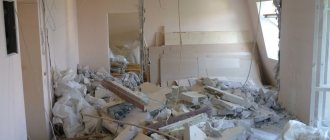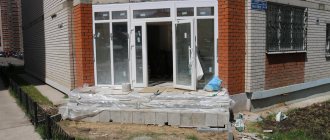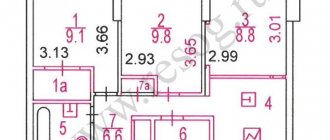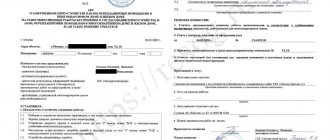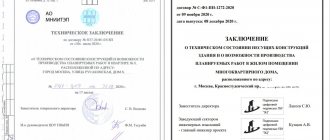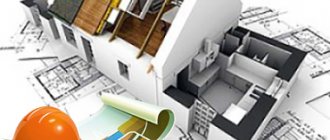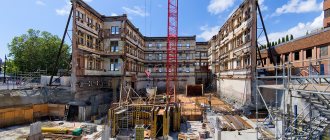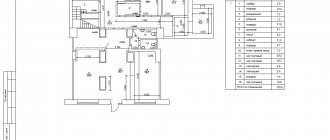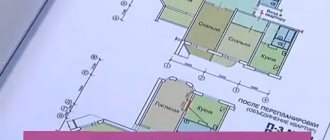All about fines for redesigning real estate without permission:
What is considered the basis for penalties Fine for unauthorized reconstruction of an apartment How violations can be detected Responsibility for the reconstruction of a non-residential property - The procedure for assigning responsibility Where to write an application for illegal renovation of neighbors - How quickly the authorities will respond to a complaint What to do if illegal reconstruction of a non-residential property occurs
Changing the configuration of the premises and moving utility lines cannot be done without agreement with the Housing Inspectorate or the district administration. It should be borne in mind that for some works a permit is not issued. For example, it is not always possible to add a balcony or loggia to a room, or remove partitions in panel buildings. Such changes could harm neighbors or cause the building to collapse. Let's talk about liability for illegal redevelopment of an apartment in 2019.
- Laws and finance
Legalization of redevelopment of non-residential premises: what to do and where to go
The Armed Forces explained how to coordinate a double redevelopment
Many years ago, Larisa Verbina* remodeled her apartment: she installed partitions in the room and demolished the stove, which created a corridor and changed the living area by 1.6 square meters. m. However, she never applied for approval of construction work to redevelop the apartment.
In 2021, Verbina again planned a major renovation: she wanted to replace the floor in the bathroom and install a partition between the bathroom, kitchen and hallway. This time, before carrying out the work, she ordered a redevelopment project and contacted the Novorossiysk Department of Architecture and Urban Planning to obtain approval. But she was refused, citing the fact that the previous redevelopment was carried out without obtaining prior approval, and they were advised to first legitimize all the changes made in court. However, the Primorsky District Court of Novorossiysk rejected Verbina’s claim to preserve the apartment in a redesigned state. This decision has come into force. Then the owner began to appeal the management’s refusal in court. She motivated her demands by the fact that Art. 27 of the Housing Code does not contain such a basis for refusing approval of the planned redevelopment “due to the presence of previously completed redevelopment that is not related to the planned one.”
CASE No. 18-КГ17-281
PLAINTIFF: Larisa Verbina*
RESPONDENT: Department of Architecture and Urban Planning of Novorossiysk
COURT: Supreme Court of the Russian Federation
CASE DETAILS: The plaintiff asks the court to declare illegal the decisions to refuse approval of the planned redevelopment
DECISION: The acts of the courts that rejected the claim are canceled and the case is sent for a new trial to the court of first instance
The Primorsky District Court of Novorossiysk took the side of the administration, the judicial panel for administrative cases of the Krasnodar Regional Court agreed with it. They proceeded from the fact that the legislation does not regulate the procedure for obtaining approval for the actual redevelopment, which was carried out long before the plaintiff applied for permission to carry out a new redevelopment. In addition, according to the courts, the contested refusals in form and content comply with the provisions of Art. 26–27 LCD and do not violate Verbina’s rights. The judge of the Krasnodar Regional Court did not submit the cassation appeal for consideration.
When the case reached the Supreme Court, it reminded: Part 1 of Art. 27 of the Housing Code establishes an exhaustive list of grounds on which approval for the reconstruction and redevelopment of residential premises may be refused. This list is not subject to broad interpretation, and there really is no reason “in connection with the presence of previously completed redevelopment not related to the planned one.” The Supreme Court also noted that the court of first instance did not evaluate the grounds for the refusal; did not take into account that the administrative plaintiff applied for redevelopment of only part of the apartment; I did not find out whether this redevelopment is planned or actually implemented and whether it is related to the existing one. Therefore, the Supreme Court overturned the decisions of the lower courts and sent the case for a new trial to the court of first instance (No. 18-КГ17-281).
The presence of illegal redevelopment should not become a “wolf ticket” for the owner. The fact of such redevelopment should be the subject of a one-time administrative response, and not a stigma for life.
Sergey Patrakeev, partner at Kovalev, Tugushi and Partners
“The lower courts, together with local government bodies, demonstrated a formal approach to the applicant’s appeal and refrained from introducing legal certainty. Illegal redevelopment is grounds for administrative liability. However, the authorities did not initiate an administrative case, but instead began to create bureaucratic obstacles for the owner to exercise his rights,” said Sergei Patrakeev, partner at Kovalev, Tugushi and Partners. “The Supreme Court rightly overturned the judicial acts of the lower courts, concluding that the evidence available in the case was insufficient. It is important that the Supreme Court drew attention: it is impossible to refuse to redevelop an apartment on grounds not established in the residential complex, even if it is known about violations committed by the owner,” says ALTHAUS Group adviser, Ph.D. n. Susana Kirakosyan. She also said that similar legal disputes regarding illegal refusals to redevelop were considered by arbitration courts and courts of general jurisdiction (N A40-195113/16, N A40-188728/16, N 33-7147/14, N 33A-88/2017, N 33A-5733/2017). “The refusals in these disputes were motivated by the inconsistency of the project for redevelopment of premises with the legislation of the Russian Federation or the legislation of the city of Moscow, without indicating the specific norms of the violated law and without the requirement to submit additional documents or perform additional work,” Kirakosyan said.
*name and surname have been changed by the editors
- Alina Mikhailova
- Supreme Court of the Russian Federation
What is included in unauthorized redevelopment in an apartment building
Some work can be done without legalization by simply registering it with the BTI. These include:
- Increasing the size of the kitchen, bathroom and room due to the corridor or storage room.
- Glazing of balconies.
- Installation of new equipment (without disrupting communications).
- Expansion of the doorway.
- Unification of the bathroom.
For any other intervention in the original housing project drawn up in the technical plan, written permission must be obtained. To do this, you will need an architectural plan for the future housing developed by engineers, confirmation of ownership and signatures of other owners.
If there is neither one nor the other, the repair is considered unauthorized. It will be the same if a positive decision was received from the municipality, but during the renovation process the owner changed the approved architectural design. This will become clear immediately after construction is completed. The controlling organization will appoint a commission that will check the compliance of the work performed with the plan.
Such an object cannot be put into operation until it is brought into the required technical condition. All definitions and rules regarding the approval process are specified in the Housing Code of the Russian Federation, articles 25-29.
Photo: Instagram @mb_designstudio
Work that will definitely not be approved: moving a bathroom to a residential area, demolishing and covering a ventilation duct, closing access to risers and meters, converting an attic, adding an attic, attaching a loggia to floors above the first, demolishing a load-bearing wall, moving water supply risers, etc.
- Kitchen
Kitchens with gas: what repairs are indicated and contraindicated for them
What fine is imposed for illegal redevelopment of an apartment in 2019?
Let's look at Art. 7.21 Code of Administrative Offenses of the Russian Federation. According to this article, the violator receives a penalty of 2 to 2.5 thousand rubles. The amount seems small, but it won’t stop there. The inspector will issue you an order to legalize all changes or return the living space to its previous condition. The second option is for cases where work harms the stability of the building or the comfortable living of neighbors.
If the owner refuses to comply with the instructions, he is sued. According to clause 5, art. 29 of the Housing Code of the Russian Federation, a fined apartment can be sold at public auction. Part of the proceeds is kept for repairs, the rest goes to the owner. In addition, citizens who do not comply with the instructions of the district administration are limited in traveling to other countries.
In the case of social housing, in the same situation the contract with the tenant is terminated, and the owner bears responsibility for the changes.
- Laws and finance
What is an alternative deal: a real estate expert explains
Fine for illegal redevelopment of non-residential premises in 2021.
All the information described above is also relevant for non-residential premises located in residential buildings. The only difference is the fact that the fine for redevelopment of non-residential premises without permission for the legal entity that owns the premises will, in accordance with the same subparagraph of Article 7.21 of the Code of Administrative Offenses of the Russian Federation, amount to 40-50,000 rubles, and this is already a more significant amount. And it will not be possible to avoid this fine.
In times of crisis, housing inspectors received special instructions to collect such fines as much as possible for illegal redevelopment. Below we have given an example of a resolution imposing an administrative penalty for non-residential premises. We also recommend that you read articles about coordinating the redevelopment of non-residential premises and how to legalize the redevelopment of non-residential premises.
Fine for illegal redevelopment of non-residential premises
I hope our article was able to answer your question “how much is the fine for remodeling an apartment or non-residential premises?”
How can illegal redevelopment be detected?
No one will come to you just to check, but neighbors may become interested in the constant noise and mountains of bulky garbage and complain about the construction site. The inspector will pay a visit if the rights of other residents are violated. For example, you refurbished the home to your taste and took away part of the common area, or flooded the people living below you due to the expansion of the bathroom into the residential area. In this case, another possible consequence is compensation to neighbors.
The inspectorate also checks when cracks appear inside or outside the building. If it turns out that you are at fault - a fine and an obligation to legalize or eliminate the activity. Other common situations in which the problem is detected:
- Sale. You can sell such real estate, but there is one caveat. Conversions are the responsibility of the buyer, making them difficult to find. In this regard, the seller often has to underestimate the price.
- Mortgage. Such difficulties may arise when purchasing a renovated apartment on credit.
- Organization and preparation
7 official requirements you should know about before repairs so as not to break the law
